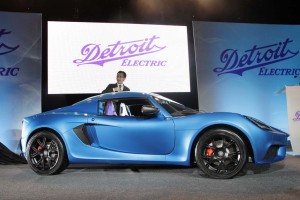When little battery sports car start-up Detroit Electric promised to have its SP:01 in production by August of this year, more than a few skeptics thought it was too good to be true. They were right.
The maker has yet to lock down a manufacturing site for the Lotus-based two-seater, Detroit Electric officials have confirmed. Meanwhile, they indicate they are in negotiations with potential partners that could “impact our business strategy and timing.”
How things shake out could become more obvious in the coming weeks, according to Don Graunstadt, the president of Detroit Electric’s North American operations, though he told the Detroit News that the ambitious start-up “remains 100 percent committed to the Detroit area,” where it hopes to produce at least some of the products it is developing.
Planning to revive the name of an old battery-car manufacturer that went out of business during the Great Depression, Detroit Electric unveiled the SP:01 during a news conference in the Motor City last March. At the time, CEO and founder Albert Lam admitted that such an ambitious venture walked the line “between sanity and insanity.”
Skeptics leaned towards the latter, especially after hearing that not only was Detroit Electric planning to begin producing its electric sports car by the end of summer but that it had not even locked down a manufacturing site yet.
According to Grunstadt, the company has its eye on a facility in the Detroit suburb of Plymouth, but has yet to lock down either a purchase agreement or lease. It is now unclear precisely when that operation – which is expected to employ 100 workers and produce 2,500 of the SP:01 sports cars – will be completed.
“To further elaborate at this juncture is, unfortunately, not possible as Detroit Electric have entered into negotiations with other parties that have the potential to impact our business strategy and timing,” Graunstadt said in an e-mail to the News.
The executive said he was bound by the confidentiality required of the latest discussions and acknowledged that there were numerous “variables” that could lead to a shift in Detroit Electric’s plans.
Part of the challenge for the firm is finding a viable way to support its unusual business plan. While it plans to complete final assembly of the SP:01 in Michigan, most of the primary production will be handled by Lotus in Europe.
In fact, Detroit Electric envisions itself using contract manufacturing for all of its future products, rather than relying on its own assembly lines. That includes plans for its second product line, a midsize battery-car it hopes to introduce in mid-2014. That product will use an electric drivetrain developed by the Detroit firm but the vehicle itself will be a version of the Emgrand EC7 produced by China’s Geely – which is the parent of Sweden’s Volvo Cars.
Ultimately, Detroit Electric hopes to produce a broad range of battery-cars, including mainstream models and sports cars.
Founder Lam told TheDetroitBureau.com earlier this year that his firm is looking for a variety of investors but had specifically ruled out discussions with Chinese government-owned investors and companies. Many of China’s leading financial houses and manufacturers have strong ties to the government or the military.
It is unclear if Detroit Electric has revised that policy in its search for capital. But in his e-mail to the Detroit News, North American chief Graunstadt insisted, “Detroit Electric remains 100 percent committed to the Detroit area, the State of Michigan and the residents therein.”

